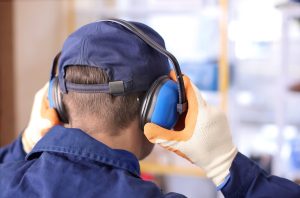Occupational Hearing Loss Is A Common Work Injury

Occupational hearing loss is a serious concern that often flies under the radar. It’s a condition that results from exposure to excessive noise levels and chemicals in the workplace. While hearing loss may not be as immediately visible as a broken bone or a burn, it’s a real and permanent problem that often results in workers’ compensation claims.
How many workers are at risk of job-related hearing loss?
Occupational hearing loss is one of the most prevalent work-related conditions. Hearing risks are present across all industries, affecting millions of U.S. workers each year.
The NIOSH Recommended Exposure Limit is 85 decibels (A-weighted) averaged over an eight-hour workday. However, roughly 22 million workers are exposed to noise levels well above the recommended exposure limit.
Another 30 million workers encounter ototoxic chemicals that can harm their hearing. This chemical disrupts the cochlea, a spiral-shaped structure in the inner ear that contains thousands of hair cells. These hair cells are responsible for detecting different frequencies of sound.
What are the consequences of occupational hearing loss?
Hearing loss can be life-altering, impacting individuals in several ways. This includes:
- Communication difficulties: A direct consequence of hearing loss is communication difficulties. It becomes challenging to maintain relationships with others, both personally and professionally.
- Health issues: Hearing loss is not an isolated problem. It’s linked to tinnitus (ringing in the ears), heart problems, cognitive decline, and poor mental health. These issues can significantly impact a worker’s quality of life.
- Safety concerns: Workers suffering from hearing loss may also face concerns about personal safety and the safety of those around them. In a work environment, this can lead to accidents and injuries if a worker can’t hear potential hazards.
How can I prevent occupational hearing loss?
The good news is that occupational hearing loss is preventable. Employers should prioritize their employees’ hearing health by implementing comprehensive hearing conservation programs. This includes:
- Implementing noise control measures.
- Offering regular hearing testing.
- Providing personal protective equipment, such as earplugs or earmuffs.
- Training employees about the risks of workplace noise and the importance of protecting their hearing.
Workers should also take responsibility for their own hearing health by using the provided protection and reporting any concerns to their employers.
Should I file a workers’ comp claim if I lost my hearing?
If you have experienced occupational hearing loss, it’s crucial to understand your rights. You have the right to file a workers’ compensation claim in Massachusetts or Rhode Island. The workers’ compensation system provides financial and medical support to those who have suffered job-related injuries or illnesses. This includes hearing loss caused by workplace conditions.
The experienced legal team at the Law Offices of Deborah G. Kohl understands the workers’ compensation process. Our attorneys can work tirelessly to ensure your claim is properly filed and you receive the benefits you deserve. We understand that hearing loss can have a profound impact on your life, and we’re here to support you every step of the way.
Don’t let occupational hearing loss go unaddressed. Contact us to schedule a free consultation. We’ll go over your potential legal options and answer any questions you have.
